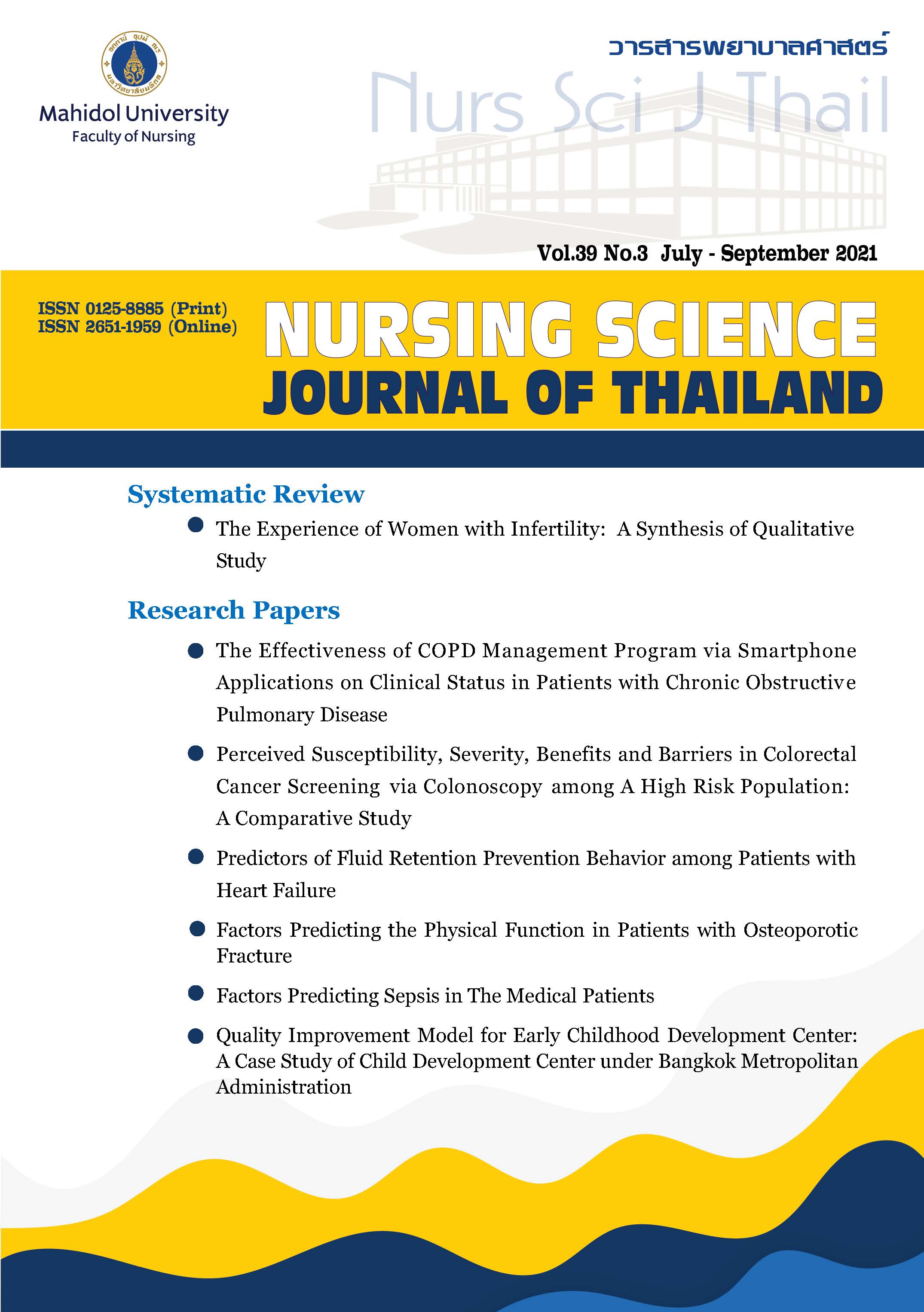Quality Improvement Model for Early Childhood Development Center A Case Study of Child Development Center under Bangkok Metropolitan Administration
Main Article Content
Abstract
Purpose: To develop a model of quality improvement for early childhood development center under Bangkok Metropolitan Administration (BMA).
Design: Participatory action research implemented at one of BMA child development centers.
Method: Purposive sampling was used to recruit twelve persons including caregivers, parents, a community head, healthcare personnel and district officers. Data collection included review of related document, observation, in-depth interview, and focus group. The National Standard for Early Childhood Care, Development and Education Thailand was used as the core tool for participatory assessing the quality at three time points: prior to the project participation, at 4th month after starting the project, and at 9th month (ending the project). The data were analyzed using frequency, percentage, and content analysis.
Main findings: The model of quality improvement for early childhood development center consists of 6 steps: 1) self-assessment 2) empowerment for change 3) Revision for better results 4) Education and skills for early childhood care 5) Implementation 6) Improvement. The three-times outcomes showed the rise of scores in the following standards: Standard 1 Administration, from 26.9% to 51.3% and 76.9%; Standard 2 Teachers and Caregivers, from 11.7% to 18.3% and 68.3%; and Standard 3, Quality of Early Childhood, from 9.1% to 9.1% and 69.8%, respectively.
Conclusion and recommendations: Quality improvement rooted in the first 3 steps of participatory actions in self-assessment, empowerment for change, and revision for better results are essential stages for related persons to get ready for uplifting the quality of the center to achieve the sustainable standards. Healthcare personnel can be a part of the participatory development process resulting in the quality child care centers where preschool children receive a good care and have age-appropriate growth and development.
Article Details
Copyright Notice: Nursing Science Journal of Thailand has exclusive rights to publish and distribute the manuscript and all contents therein. Without the journal’s permission, the dissemination of the manuscript in another journal or online, and the reproduction of the manuscript for non-educational purpose are prohibited.

Disclaimer: The opinion expressed and figures provided in this journal, NSJT, are the sole responsibility of the authors. The editorial board bears no responsibility in this regard.
References
National Economic and Social Development Board, Office of the Prime Minister. The twelfth national economic and social development plan (2017-2021) [Internet]. Bangkok: National Economic and Social Development Board; 2016 [cited 2020 Sep 30]. Available from: https://www.nesdc.go.th/ewt_dl_link.php?nid=6422. (in Thai).
National Economic and Social Development Board. The national strategy (2018-2037) Sustain Development Goals: SDGs [Internet]. Bangkok: National Economic and Social Development Board; 2015 [cited 2020 Sep 30]. Available from: https://www.un.or.th/globalgoals/th/global-goals/quality-education. (in Thai).
Strategy and Planning Division, Office of the Permanent Secretary, Ministry of Public Health. Twenty-year national strategic plan for public health (2017-2036): first revision 2018 [Internet]. Nonthaburi: Strategy and Planning Division, Office of the Permanent Secretary Ministry of Public Health; 2016 [cited 2020 Sep 30]. Available from: https://waa.inter.nstda.or.th/stks/pub/2017/20171117-MinistryofPublicHealth.pdf. (in Thai).
Office of the Education Council. National standard for early childhood care, development and education Thailand. Bangkok: Prigwhan Graphic; 2019. 55 p. (in Thai).
Social Development Department, Bangkok Metropolitan Administrator. The information about the number of children within early childhood care Bangkok [Internet]. Bangkok: Social Development Department, Bangkok Metropolitan Administrator; 2019 [cited 2020 Oct 30]. Available from: http://www.bangkok.go.th/social/page/sub/13707/สถิติข้อมูลชุมชนของกรุงเทพมหานคร. (in Thai).
National Statistical Office, National Health Security Office, UNICEF. Complete report: survey of the situation of children and woman in Thailand 2015-2016 [Internet]. Bangkok: National Statistical Office; 2016 [cited 2020 Sep 30]. Available from: http://doh.hpc.go.th/data/mch/MICS5_full_th.pdf. (in Thai).
AUTOMATED QA [Internet]. Bangkok: The Office for National Education Standards and Quality Assessment (Public Organization); c2011 [updated 2011; cited 2020 Oct 20]. Available from: https://aqa.onesqa.or.th/SummaryReport.aspx. (in Thai).
Jiawiwatkul U. Participatory action research: key concepts and lessons. Bangkok: P.S. Livingston; 2010. 116 p. (in Thai).
Phatanaphongpthon J, Boonsuwan C, Thanacharoenwat N. The study of Thai early child development [Internet]. Nonthaburi: Maternal and Child Health Group, Office of Health Promotion, Department of Health, Ministry of Public Health; 2015 [cited 2019 May 20]. Available from: http://hp.anamai.moph.go.th/ewt_dl_link.php?nid=1524. (in Thai).
Rattanan Y. The study factors affecting children’s development in the eight-health area [Internet]. Khon Kaen: Regional Health Center 7 Khon Kaen; 2016 [cited 2020 Oct 20]. Available from: http://203.157.71.148/hpc7data/Res/ResFile/2560001201.pdf. (in Thai).
Phongphetdit B, Authawee B. Factors affecting the development of early childhood Thailand: public health region 5. Kuakarun Journal of Nursing. 2020;27(1):59-70. (in Thai).
Ruzek E, Burchinal M, Farkas G, Duncan GJ. The quality of toddler child care and cognitive skills at 24 months: propensity score analysis results from the ECLS-B. Early Child Res Q. 2014;28(1):10.1016/j.ecresq.2013.09.002. doi: 10.1016/j.ecresq.2013.09.002.
Nimit-arnun N, Klinhom W, Morsup T. Community empowerment: concept and applications in community practitioner nursing practice. Journal of Nursing and Health Sciences. 2020;14(1):13-23. (in Thai).
Hanrungcharotorn U. Community empowerment. Journal of Nursing Science Naresuan University. 2008;2 Special:1-5. (in Thai).
Jehnok M, Jeharsae R. Effects of the participatory developmental stimulation program for care takers on development status of 2-5 years old children. Academic Services Journal, Prince of Songkla University. 2019;30(2):80-8. (in Thai). doi: 10.14456/asj-psu.2019.29.
Robbin SP, Judge TA. Organizational behavior. 15th ed. Boston, MA: Pearson; 2013. 676 p.


